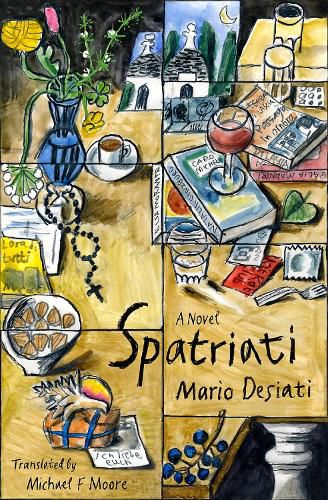Readings Newsletter
Become a Readings Member to make your shopping experience even easier.
Sign in or sign up for free!
You’re not far away from qualifying for FREE standard shipping within Australia
You’ve qualified for FREE standard shipping within Australia
The cart is loading…






Following two outcasts' tumultuous friendship, this brilliant, Strega Prize-winning novel captures the probing, passionate nature of a generation of global citizens, exploring sexuality and identity.
Following two outcasts' tumultuous friendship, this brilliant, Strega Prize-winning novel captures the probing, passionate nature of a generation of global citizens, exploring sexuality and identity.
I never understood, of the two of us, which one was warm and which cold, but I consider myself lucky to have met my opposite front in Claudia Fanelli, the spatriata, the name people around here use for the uncertain, the odd, the unclassifiable and sometimes the shiftless or orphans, as well as unmarried men or women, vagrants and vagabonds, or even, in the case that concerns us, the emancipated.
Claudia enters Francesco's life on a sunny morning, in the school's entrance hall- it's a bolt of lightning, the birth of an entirely new kind of desire, which is, above all, the desire for life. Claudia is peerless and self-assured, extravagant; Francesco is introverted, burning with erotic curiosity, dominated by rustic faith, uncertain. She provokes him- "Did you know that your mother and my father were lovers?" But in the eyes of that meek boy, she glimpses a spark of rebellion- she sees herself in him. They become adults together, in a symbiotic game of escape and pursuit, in which they always end up finding each other.
Mario Desiati captures the complexities of a fluid, uprooted generation- his own. A generation around forty years old today, who weren't afraid to stray far from home to find their place in the world, who truly feel like citizens of Europe. With a poetic yet biting style, capable of great tenderness, Desiati depicts the myriad forms that desire can assume when given free rein. Without any fear of plucking the chords of romanticism, without any false modesty as he delves into the coarsest details of sensuality and instinct.
$9.00 standard shipping within Australia
FREE standard shipping within Australia for orders over $100.00
Express & International shipping calculated at checkout
Following two outcasts' tumultuous friendship, this brilliant, Strega Prize-winning novel captures the probing, passionate nature of a generation of global citizens, exploring sexuality and identity.
Following two outcasts' tumultuous friendship, this brilliant, Strega Prize-winning novel captures the probing, passionate nature of a generation of global citizens, exploring sexuality and identity.
I never understood, of the two of us, which one was warm and which cold, but I consider myself lucky to have met my opposite front in Claudia Fanelli, the spatriata, the name people around here use for the uncertain, the odd, the unclassifiable and sometimes the shiftless or orphans, as well as unmarried men or women, vagrants and vagabonds, or even, in the case that concerns us, the emancipated.
Claudia enters Francesco's life on a sunny morning, in the school's entrance hall- it's a bolt of lightning, the birth of an entirely new kind of desire, which is, above all, the desire for life. Claudia is peerless and self-assured, extravagant; Francesco is introverted, burning with erotic curiosity, dominated by rustic faith, uncertain. She provokes him- "Did you know that your mother and my father were lovers?" But in the eyes of that meek boy, she glimpses a spark of rebellion- she sees herself in him. They become adults together, in a symbiotic game of escape and pursuit, in which they always end up finding each other.
Mario Desiati captures the complexities of a fluid, uprooted generation- his own. A generation around forty years old today, who weren't afraid to stray far from home to find their place in the world, who truly feel like citizens of Europe. With a poetic yet biting style, capable of great tenderness, Desiati depicts the myriad forms that desire can assume when given free rein. Without any fear of plucking the chords of romanticism, without any false modesty as he delves into the coarsest details of sensuality and instinct.